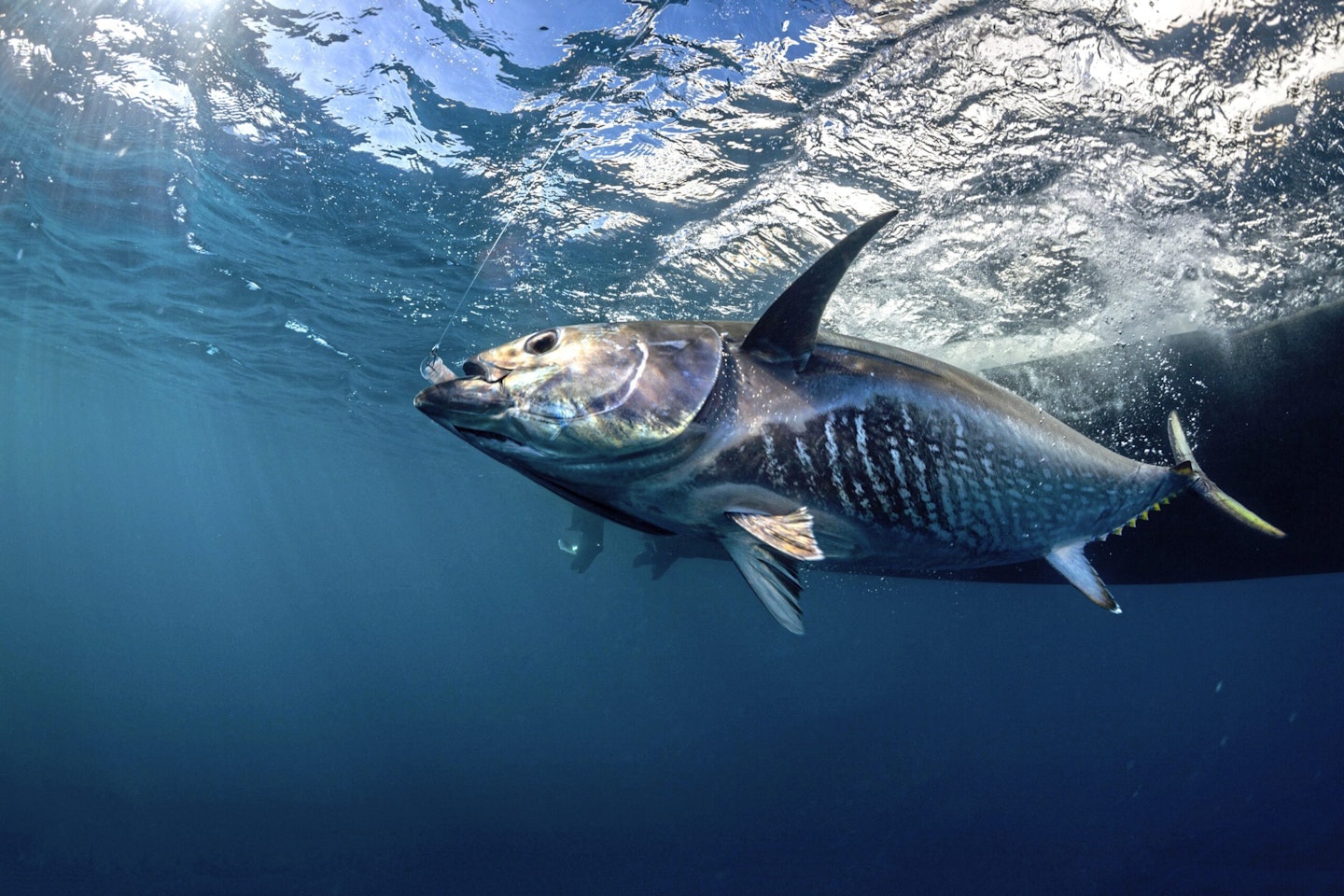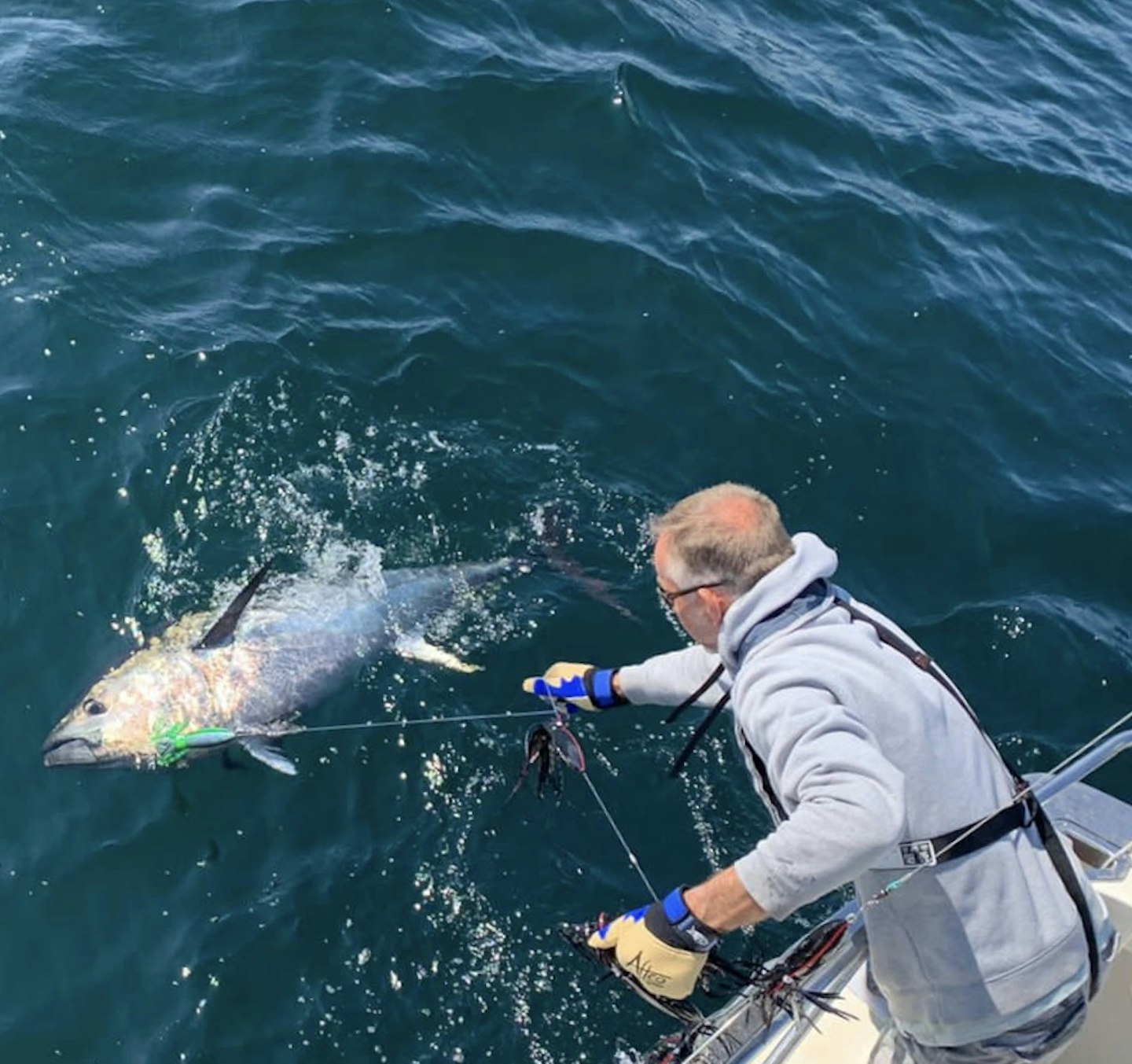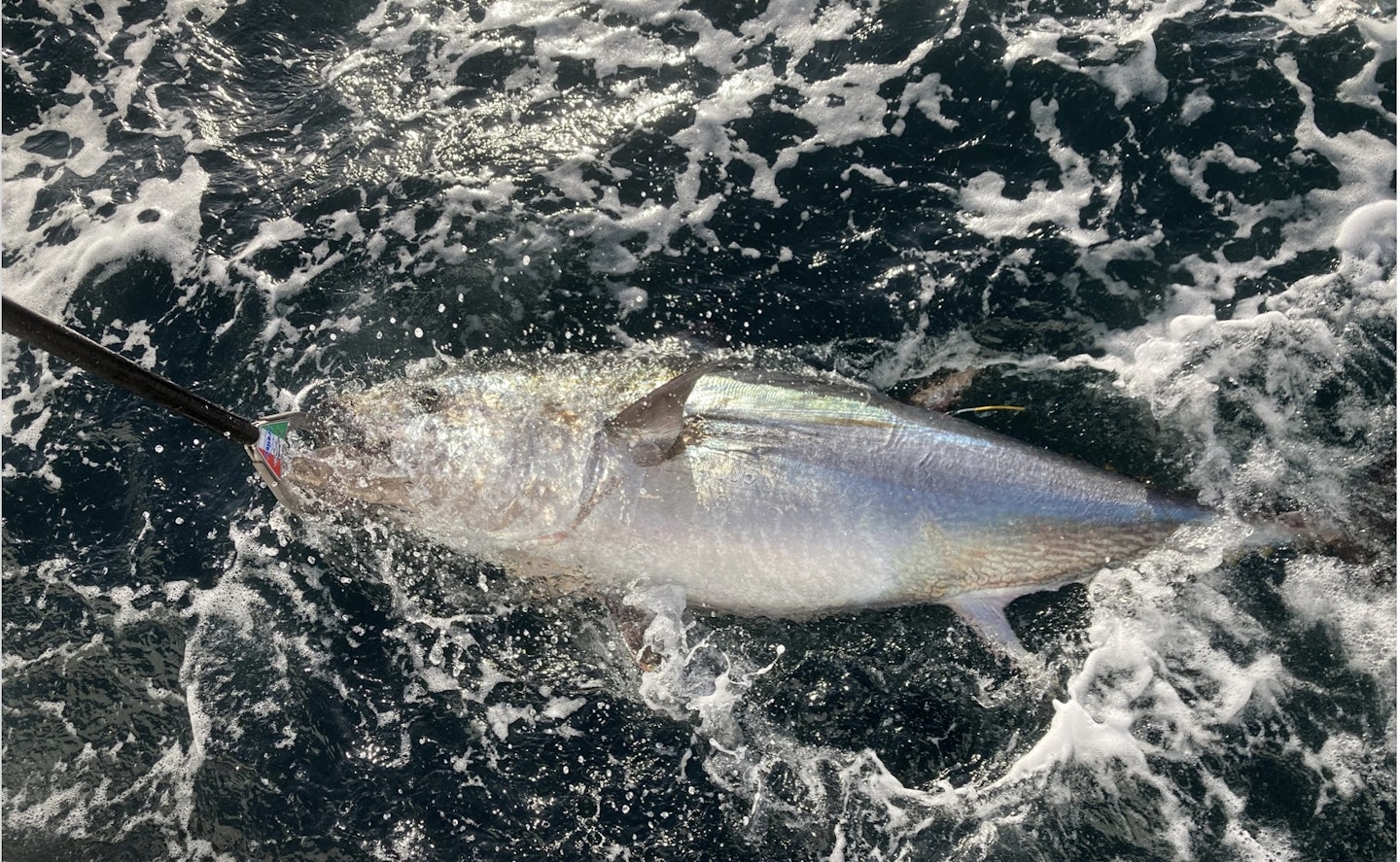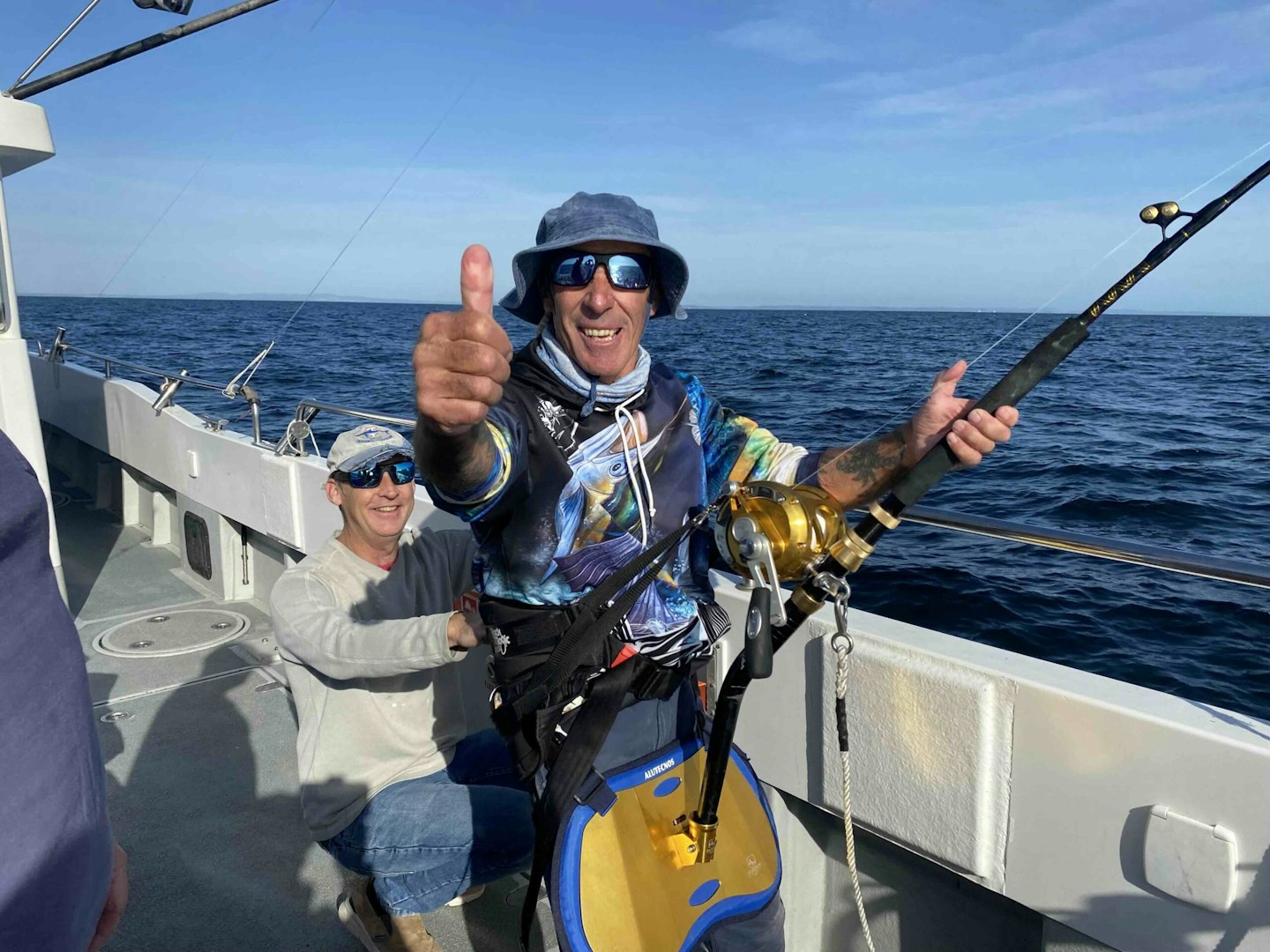This weekend, the first-ever licensed Atlantic bluefin tuna fishery will open in England and Wales. These fisheries will operate under a license as mandated by the species' international management body, ICCAT. A total of 89 licensed charter and private vessels in England, along with 9 charter vessels in Wales, will head out to fish for giant bluefin tuna in our waters.
The journey to this point began over six years ago when the Angling Trust and the predecessor of the UK Bluefin Tuna Association launched a campaign to involve anglers in learning more about these fish and possibly establishing a catch-and-release fishery.
This campaign led to the creation of the English CatcH and Release Tagging program in 2021, with Welsh and Northern Irish equivalent programs following the next year.
FANCY GIVING SEA FISHING A GO THIS YEAR? HERE ARE SOME OF THE BEST SPOTS TO TRY.

Under CHART, over 3,200 bluefin were tagged and released over three years. This effort gathered extensive data to enhance our understanding of the species and generated millions of pounds for various businesses in the ports where it operated. After two public consultations, DEFRA decided to transition from a science-focused fishery to a larger,less constrained catch-and-release fishery starting this year. The Welsh government reached the same conclusion and followed suit.
CHART was widely regarded as a success by charter skippers, anglers, scientists, and government officials, and it served as a great example of collaboration between these groups, which continued in the design of the Catch and Release Recreational Fisheries (CRRF).
Martin Salter, Head of Policy at the Angling Trust, said:
“Following years of efforts to secure recognition and equitable treatment for the recreational sector, the 'wins' that brought us here highlight the significant progress made in establishing a bluefin tuna fishery.”
A DEFRA official stated:
“Bluefin tuna holds an important place in the UK’s fishing history, and we are delighted to see them return to UK waters in such numbers to be recreationally fished. This new fishery will not only allow anglers to catch and release bluefin tuna but will also continue to support our precious coastal communities.”
Steve Murphy, CEO of the UK Bluefin Tuna Association, noted:
“The CRRF is a 'lighter touch' fishery as determined by DEFRA. However, stakeholders had differing opinions with DEFRA regarding some aspects of this first year of operations, and we have been transparent about these disagreements.”
“We must remember that collaboration and co-design require compromise on both sides. While the result may not be perfect, we should not lose sight of the fact that this is a significant step forward. However, it is only the first step in a process that should see the CRRF evolve and grow in the coming years,” said Steve Murphy, CEO of the UK Bluefin Tuna Association.
NEED SOME TIPS TO IMPROVE YOUR SEA FISHING? CHECK OUT THIS TACTICS ADVICE ARTICLE.

Stuart Singleton-White, Head of Campaigns at the Angling Trust, commented:
“This is an exciting time for sea angling, offering us the chance to experience some of the best game angling in the world right on our doorstep. There’s no need to travel thousands of miles to enjoy it.”
“Of course, it’s only year one, and we still have things to learn. We will continue to push DEFRA and the MMO to improve and expand this fishery in the coming years. But after over six years of hard work to reach this point, let’s just go out and enjoy our fishing.”
Steve Murphy also added:
“The recent Angling Times article contained some misunderstandings, and we are grateful for the opportunity to correct them. The UKBFTA, Angling Trust, and PBA do not ‘run the fishery’ and do not decide who receives permits. Our role was to lobby for CHART, then the CRRF, and to advise DEFRA, MMO, CEFAS, and others on various design and delivery aspects, drawing upon the expertise of very experienced skippers, crew, and anglers.”
“No conclusion was ever going to satisfy everyone, but we are confident that the vast majority interested in a safe, sustainable fishery will continue to support it, as evidenced by the demand to fish in CHART over the past three years.”
“As stakeholders, we were disappointed by the decision not to make training mandatory for new entrants as a condition of the permit. However, we continued to work within the constraints of this decision made by DEFRA and the MMO. To mitigate the risks associated with this decision, we secured FASS funding and collaborated with experienced bluefin skippers to design and deliver several ‘on-vessel’ training days, which were offered to applicants free of charge.”
“At the time of writing, dozens of permit-holding new entrants have taken advantage of this training.”
TUNA AREN'T THE ONLY FISH THRIVING ON THE UK COASTLINE, CHECK OUT THE FISH YOU CAN CATCH AT YOUR LOCAL BEACH RIGHT NOW.

In addition to the training, stakeholders have worked with DEFRA, the MMO, CEFAS, and Natural England to produce a 'Code of Conduct' that provides guidance on regulations, angler safety, fish welfare, and the use of adequate gear.
Reinforcing this Code of Conduct are nearly a dozen published resources available to all via the UKBFTA website, developed with input from some of the most experienced bluefin skippers, crew, and anglers in the UK. These resources cover gear, techniques, ensuring fish welfare, and angler safety. We will also soon add a number of "how-to" videos to complement this training material.
While uptake of this training may not be mandatory, creating such events and making these resources available ensures that permit holders have access to valuable training, support, and guidance.
The use of a ‘lottery’ in the event of oversubscription was disclosed to applicants as early as September of last year in DEFRA’s second consultation on the potential fishery.

Rob Thompson, Bluefin Tuna Representative at the Professional Boatman’s Association, said:
“We urge disappointed anglers to be patient and refrain from undermining the fishery by engaging in unauthorized targeting of bluefin this year. Such actions pose risks both personally and to the reputation and future of the fishery.”
“Sustainably managing our marine life is essential if we are to continue to enjoy it. That’s why all permitted vessel owners are legally required to report their recreational bluefin tuna fishing trips to the MMO. The data collected will be used to enhance the monitoring of bluefin tuna populations,” said DEFRA.
The UKBFTA stated that a recent article in Angling Times contained several factual errors in the statistics presented by those involved in the interview:
“Over the three years of the English CHART program, 4,500 anglers participated, and over 3,200 bluefin were tagged and released.”
“During these three years, the incidental mortality rate was just 0.7%. The article cited a 3.4% mortality rate, but this figure comes from a Canadian research program, which is materially different from the English CHART program.”
“A total of 160 applications for permits were received for the original 85 available for England: 63 from licensed charter vessel operators and 97 from private vessel owners.”
The Fisheries Act includes an obligation to optimize the socio-economic benefits of the fishery. This means that charter vessels, which generally generate higher economic benefits than private vessels, are given priority.
All 63 charter vessel applications met the criteria set by DEFRA and the MMO and were granted permits. This left only 26 permits available this year for private vessels. However, additional permits were subsequently secured from the Welsh Government, allowing for another four permits to be issued to the private vessel sector.
“As we head out on the water this weekend, let us show the world the incredible fishery we have and the skill of our skippers, crew, and anglers.”
“We have the chance to create something truly special on our doorstep, with potentially the best bluefin tuna fishery in the world within our grasp,” Steve concluded.

